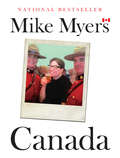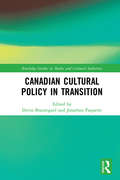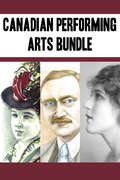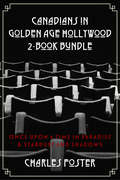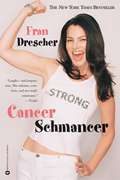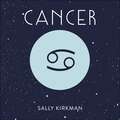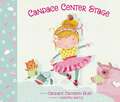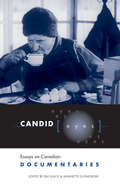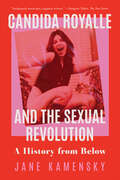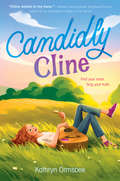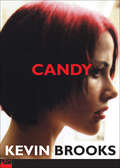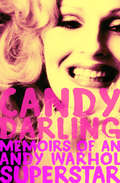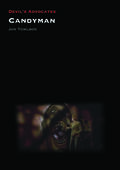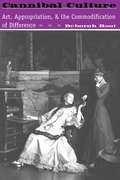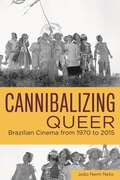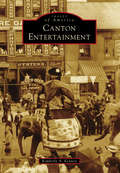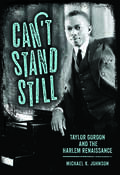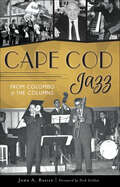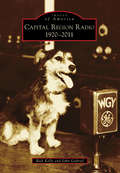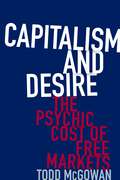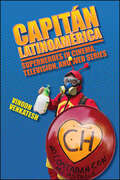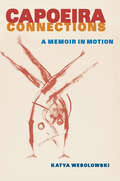- Table View
- List View
Canada
by Mike MyersComedy superstar Mike Myers writes from the (true patriot) heart about his 53-year relationship with his beloved Canada. Mike Myers is a world-renowned actor, director and writer, and the man behind some of the most memorable comic characters of our time. But as he says: "no description of me is truly complete without saying I'm a Canadian." He has often winked and nodded to Canada in his outrageously accomplished body of work, but now he turns the spotlight full-beam on his homeland. His hilarious and heartfelt new book is part memoir, part history and pure entertainment. It is Mike Myers' funny and thoughtful analysis of what makes Canada Canada, Canadians Canadians and what being Canadian has always meant to him. His relationship with his home and native land continues to deepen and grow, he says. In fact, American friends have actually accused him of enjoying being Canadian--and he's happy to plead guilty as charged. A true patriot who happens to be an expatriate, Myers is in a unique position to explore Canada from within and without. With this, his first book, Mike brings his love for Canada to the fore at a time when the country is once again looking ahead with hope and national pride. Canada is a wholly subjective account of Mike's Canadian experience. Mike writes, "Some might say, 'Why didn't you include this or that?' I say there are 35 million stories waiting to be told in this country, and my book is only one of them." This beautifully designed book is illustrated in colour (and not color) throughout, and its visual treasures include personal photographs and Canadiana from the author's own collection. Published in the lead-up to the 2017 sesquicentennial, this is Mike Myers' birthday gift to his fellow Canadians. Or as he puts it: "In 1967, Canada turned one hundred. Canadians all across the country made Centennial projects. This book is my Centennial Project. I'm handing it in a little late. . . . Sorry."From the Hardcover edition.
Canadian Cinema Since the 1980s
by David L. PikeAward-winning author David L. Pike offers a unique focus on the crucial quarter-century in Canadian filmmaking when the industry became a viable force on the international stage. Pike provides a lively, personal, and accessible history of the most influential filmmakers and movements of both Anglo-Canadian and Quebecois cinema, from popular movies to art film and everything in between.Along with in-depth studies of key directors, including David Cronenberg, Patricia Rozema and Denys Arcand, Jean-Claude Lauzon, Robert Lepage, Léa Pool, Atom Egoyan, and Guy Maddin, Canadian Cinema since the 1980s reflects on major themes and genres and explores the regional and cultural diversity of the period. Pike positions Canadian filmmaking at the frontlines of a profound cinematic transformation in the age of global media and presents fresh perspectives on both its local and international contexts. Making a significant advance in the study of the film industry of the period, Canadian Cinema since the 1980s is also an ideal text for students, researchers, and Canadian film enthusiasts.
Canadian Cultural Policy in Transition (Routledge Studies in Media and Cultural Industries)
by Devin BeauregardThis book offers a comprehensive overview of Canadian cultural policy and research, at a time of transition and redefinition, to establish a dialogue between conventional and emerging foundations. Taking a historical view, the book informs insights on current trends in policy and explores global debates underpinning cultural policy studies within a local context. The book first acknowledges what Canadian cultural policy research conventionally recognizes and refers to in terms of institutions, values, and debates, before moving on to take stock of the transformations that are continuing to reshape Canadian cultural policy in terms of values, orientations, actors, and institutions. With a focus on all levels of government-- federal, provincial, and local -- the book also centers on Indigenous arts policies and practices. This systematic and inclusive volume will appeal to academic researchers, graduate students, managers of arts and culture programs and institutions, and in the areas of cultural policy, public administration, political science, cultural studies, film and media studies, theatre and performance, and museum studies.
Canadian Performing Arts Bundle: Emma Albani / John Grierson / Mary Pickford
by Peggy Dymond Leavey Michelle Labrèche-Larouche Gary EvansPresenting three titles in the Quest Biography series that profiles prominent figures in Canada’s history. In these books we explore the lives of some Canadian pioneers in the world of performing arts. Profiled are: Mary Pickford, the silent screen star of the 1920s; Emma Albani, a classical singer who reached the heights of fame in Europe; and John Grierson, a filmmaker responsible for setting up the National Film Board of Canada. Includes: Emma Albani John Grierson Mary Pickford
Canadians in Golden Age Hollywood 2-Book Bundle: Once Upon a Time in Paradise / Stardust and Shadows
by Charles FosterRevisit Hollywood’s Golden Age with insider Charles Foster, who befriended the many Canadian stars that peppered the film sets. Foster reveals the stories of the amazing influence Canadians had in the early days of the film biz. Includes: Stardust and Shadows: Canadians in Early Hollywood A Hollywood insider brings together the stories of eighteen Canadians who were celebrities during Hollywood’s formative years. Once Upon a Time in Paradise: Canadians in the Golden Age of Hollywood During Hollywood’s Golden Age, a bevy of talented Canadians earned important roles in the motion picture industry.
Cancer Schmancer (Biography Ser.)
by Fran DrescherPart inspirational cancer-survival story, part memoir-as-a-laugh-riot, CANCER SCHMANCER picks up where Fran's last book, Enter Whining, left off. After the publication of that book, Fran's life launched into a downward spiral. She separated from a long and complicated relationship, her TV series started to slip in the ratings, and the health of her beloved dog Chester was failing fast. Then came the mysterious symptoms no doctor could explain. With her trademark sense of humor, Fran tells of her long search for answers and the cancer diagnosis that she ultimately beat. But not before a gold mine of insights were revealed to her about the importance of taking charge of your own health and recognizing what's most important in life.
Cancer: The Art of Living Well and Finding Happiness According to Your Star Sign
by Sally KirkmanYou are a Cancer. You are the home lover and memory keeper of the zodiac.The signs of the zodiac can give us great insight into our day-to-day living as well as the many talents and qualities we possess. But in an increasingly unpredictable world, how can we make sense of them? And what do they mean? This insightful and introductory guide delves deep into your star sign, revealing unique traits and meanings which you didn't know. Along the way, you will discover how your sign defies your compatibility, how to improve your health and what your gifts are. ***The Pocket Astrology series will teach you how to live well and enhance every aspect of your life. From friendship to compatibility, careers to finance, you will discover new elements to your sign and learn about the ancient art of astrology. Other audiobooks in the series include: Aries, Taurus, Gemini, Cancer, Leo, Virgo, Libra, Scorpio, Sagittarius,Capricorn, Aquarius, Pisces(P)2018 Hodder & Stoughton Limited
Canción del desierto
by Laekan Zea KempUna familia disfruta de la música nocturna del desierto tejano en esta historia de tradición y recuerdo de Laekan Zea Kemp, ganadora de una Mención de Honor Pura Belpré.Todo empieza con un suave golpeteo,cuando el tío Eduardo tamborilea con las manossobre sus polvorientos pantalones. Cuando el rubor del atardecer da paso a la noche en el desierto, emergen coyotes, cigarras y lechuzas, cada uno de ellos llamando a la luna. Observando desde su porche, la familia participa en la canción. Uno por uno, cada familiar ofrece sus tambores, flauta, maracas, cuerdas y voces. Cantan con los insectos, pájaros, serpientes y sapos; y cantan con sus antepasados, una audiencia que brilla entre las estrellas. Con cada rasgueo de instrumentos heredados, los recuerdos se renuevan y los familiares que han fallecido están vivos y cercanos de nuevo. Canción del desierto tararea y suena con toda la música que un porche y el desierto más allá de él pueden contener. El conmovedor texto de Laekan Zea Kemp, ganadora de una Mención de Honor Pura Belpré, baila a través de las encantadoras ilustraciones de Beatriz Gutiérrez Hernández. Los lectores se quedarán con la reconfortante sensación de que cuando la creatividad florece, el pasado nunca está fuera de su alcance y los vínculos importantes nunca se rompen.
Candace Center Stage
by Candace Cameron BureEvery child who loves to dance will surely get a &“kick&” out of Candace Center Stage, the heartwarming and hilarious tale of a girl who joyfully embraces the song and dance in her heart … even when she doesn&’t quite fit in at ballet class. Written by Candace Cameron Bure, New York Times bestselling author and star of the hit TV series Full House and Fuller House, this charming, laugh-out-loud picture book tells the story of a little girl who quickly realizes one thing after her mother signs her up for ballet lessons … she&’s no ballerina. As Candace moves and grooves across the floor, she topples all the ballerinas in her path. Her teacher, Miss Grace, tries to teach her proper ballet positions, but Candace is more interested in shakes and shimmies than plies and pas de bourrées. When disaster strikes during the big recital, can ungraceful Candace step up and save the day? Candace Center Stage:Is an adorable picture book that tells the story of a spirited dancer who doesn&’t quite fit in at ballet classEncourages children, especially boys and girls ages 4-8, to embrace who they areIs written by actress, producer and author Candace Cameron Bure, best known for her role as D.J. Tanner on Full House and Fuller House
Candid Eyes
by Jeannette Sloniowski Jim LeachBeginning in 1922, when Robert Flaherty filmed 'Nanook of the North' in Canada's Arctic, and encouraged by John Grierson and the federal government in 1939 when they created the National Film Board of Canada (NFB), documentaries have dominated Canada's film production and, more than any other form, have been crucial to the formation of Canada's cinematic identity.Surprisingly, there has been very little critical writing on this distinguished body of work. Candid Eyes: Essays on Canadian Documentaries not only addresses this oversight in the scholarly literature, but in doing so, it presents an exceptional collection of essays by some of Canada's best known film scholars. Focusing on works produced in French and English under the NFB umbrella, the fourteen essays discuss and critique such landmark documentaries as 'Lonely Boy' (1962), 'Pour la suite du monde' (1963), and 'Kanehsatake' (1993). Long awaited and much needed, this volume will be an indispensable companion for anyone seriously interested in Canadian film studies.
Candida Royalle and the Sexual Revolution: A History from Below
by Jane KamenskyFinalist for the 2024 National Book Critics Circle Award for Biography “Assiduously researched, elegantly written.” —Margaret Talbot, The New Yorker Acclaimed historian Jane Kamensky chronicles an indelible twentieth-century American life—and offers an entirely new understanding of the so-called sexual revolution. Whether in front of the camera or behind it, Candice Vadala understood herself as both an artist and an entrepreneur. As Candida Royalle (1950–2015)—underground actress, porn star, producer of adult movies, and staunch feminist—she made a business of pleasure. She helped crystalize the broader hedonistic turn in American life in the second half of the twentieth century: a period when the rules of sex were rewritten; when the white-hot “sex wars” cleaved feminism and realigned American politics; when Big Freud, Big Drugs, and Big Porn all came into looming focus; when the sex industry of the 1970s and ’80s radically upended conventional understandings of law, technology, culture, love, and human desire. The sexual revolution was Royalle’s war—even when other avowed feminists exited the field or became her opponents—and pornography emerged as the arena in which she would wage it. With the founding of her adult film company, Femme Productions, in 1984, Royalle became an owner of the means of pornographic production, infusing her sets with the ideals of labor feminism. On-screen and off-, she was, by turns, exuberant and thoughtful, self-possessed and gleefully shameless. A trailblazer who lived along the cultural fault lines of her generation, she danced at Woodstock, marched for women’s liberation, survived the AIDS crisis, and became a talk show regular, interviewed by Phil Donahue, Dr. Ruth Westheimer, Morton Downey Jr., Jane Pauley, and many others. As a performer, director, producer, and writer, she moved the needle of her industry. But she never transcended the politics of pleasure. With full access to Royalle’s remarkable archive, historian Jane Kamensky has spent years examining the intersection of Royalle’s life with the clashes that have defined her era—and ours. Deeply informed by these never-before-studied materials, Kamensky explodes the conventions of biography, with its assumptions about who makes history and how. Written with cinematic verve, Candida Royalle and the Sexual Revolution evokes Royalle’s times in their broadest contours as Kamensky traces the rise of an improbable heroine who broke the mold and was herself broken in turn.
Candidly Cline
by Kathryn OrmsbeeA must-read for fans of Julie Murphy and Ashley Herring Blake, this queer coming-of-age story from critically acclaimed author Kathryn Ormsbee sings with heart, warmth, and hope. Born in Paris, Kentucky, and raised on her gram’s favorite country music, Cline Alden is a girl with big dreams and a heart full of song. When she finds out about a young musicians’ workshop a few towns over, Cline sweet-talks, saves, and maybe fibs her way into her first step toward musical stardom.But her big dreams never prepared her for the butterflies she feels surrounded by so many other talented kids—especially Sylvie, who gives Cline the type of butterflies she’s only ever heard about in love songs.As she learns to make music of her own, Cline begins to realize how much of herself she’s been holding back. But now, there’s a new song taking shape in her heart—if only she can find her voice and sing it.“Empowering, affirming, and sweet as all get-out.” —Lisa Jenn Bigelow, author of Drum Roll, Please
Candy (A\través Del Espejo Ser.)
by Kevin Brooks“[A] provocative, suspenseful work . . . the story plays skillfully to teens’ curiosity about the mechanics of addiction and its manic, lurid subculture.” —BooklistWhen Joe meets Candy, it seems like a regular boy-meets-girl scenario. They chat over coffee, she gives him her number, and he writes her a song. But then Joe is drawn into Candy’s world—a world of drugs, violence, and desperation. As the dark truth about Candy’s life emerges, Joe finds himself facing real danger at every twist and turn. Soon Joe’s conflicting emotions begin to mirror Candy’s, and he understands that falling in love just might be worth the struggle. This intoxicating tale of heartache, danger, and hope will enthrall teen readers.“A story as sharp as the title is sweet, with something dark lurking inside and no cozy answers . . . Some words of warning: Candy may hook you too.” —The Guardian“Versatile English author Brooks infuses his latest tale with a romantic—even mythic—grandeur sure to enthrall his fans . . . This story’s gritty street smarts will keep thrill-seekers more than entertained, while Joe’s orphic rescue mission into the netherworld of addiction gives more thoughtful readers plenty to ponder.” —Publishers Weekly (starred review)“Brooks’s plotting is masterful, and the action twists and builds to a frenzied and violent climax.” —School Library Journal“Brooks is one of the best young adult writers around. Get this book. Word-of-mouth will do the rest” —The Irish Times
Candy Darling: Memoirs of an Andy Warhol Superstar
by Candy DarlingA look into what moved Andy Warhol&’s greatest muse Located at 33 Union Square West in the heart of New York City&’s pulsing downtown scene, Andy Warhol&’s Factory was an artistic anomaly. Not simply a painter&’s studio, it was the center of Warhol&’s assembly-line production of films, books, art, and the groundbreaking Interview magazine. Although Warhol&’s first Factory on East 47th Street was known for its space-age silver interior, the Union Square Factory became the heart, brain, eyes, and soul of all things Warhol—and was, famously, the site of the assassination attempt that nearly took his life. It also produced a subculture of Factory denizens known as superstars, a collection of talented and ambitious misfits, the most glamorous and provocative of whom was the transgender pioneer Candy Darling. Born James Slattery in Queens in 1944 and raised on Long Island, the author began developing a female identity as a young child. Carefully imitating the sirens of Hollywood&’s golden age, young Jimmy had, by his early twenties, transformed into Candy, embodying the essence of silver-screen femininity, and in the process became her true self. Warhol, who found the whole dizzying package irresistible, cast Candy in his films Flesh and Women in Revolt and turned her into the superstar she was born to be. In her writing, Darling provides an illuminating look at what it was like to be transgender at a time when the gay rights movement was coming into its own. Blessed with a candor, wit, and style that inspired not only Warhol, but Tennessee Williams, Lou Reed, and Robert Mapplethorpe, Darling made an indelible mark on American culture during one of its most revolutionary eras. These memoirs depict a talented and tragic heroine who was taken away from us far too soon.
Candyman (Devil's Advocates)
by Jon TowlsonWhen Candyman was released in 1992, Roger Ebert gave it his thumbs up, remarking that the film was “scaring him with ideas and gore, rather than just gore.” Indeed, Candyman is almost unique in 1990s horror cinema in that it tackles its sociopolitical themes head on. As critic Kirsten Moana Thompson has remarked, Candyman is "the return of the repressed as national allegory": the film’s hook-handed killer of urban legend embodies a history of racism, miscegenation, lynching, and slavery, "the taboo secrets of America’s past and present."In this book, Jon Towlson considers how Candyman might be read both as a "return of the repressed" during the George H. W. Bush era, and as an example of nineties neoconservative horror. He traces the project’s development from its origins as a Clive Barker short story ("The Forbidden"); discusses the importance of its gritty real-life Cabrini-Green setting; and analyzes the film’s appropriation (and interrogation) of urban myth. The two official sequels (Candyman: Farewell to the Flesh [1995] and Candyman: Day of the Dead [1999]) are also considered, plus a number of other urban myth-inspired horror movies such as Bloody Mary (2006) and films in the Urban Legend franchise. The book features an in-depth interview with Candyman’s writer-director Bernard Rose.
Cannibal Culture: Art, Appropriation, and the Commodification of Difference (Icon Editions)
by Deborah RootIn Arizona, a white family buys a Navajo-style blanket to be used on the guest-room bed. Across the country in New York, opera patrons weep to the death scene of Madam Butterfly. These seemingly unrelated events intertwine in Cannibal Culture as Deborah Root examines the ways Western art and Western commerce co-opt, pigeonhole, and commodify so-called “native experiences.” From nineteenth-century paintings of Arab marauders to our current fascination with New Age shamanism, Root explores and explodes the consumption of the Other as a source of violence, passion, and spirituality. Through advertising images and books and films like The Sheltering Sky, Cannibal Culture deconstructs our passion for tourism and the concept of “going native,” while providing a withering indictment of a culture in which every cultural artifact and ideology is up for grabs—a cannibal culture. This fascinating book raises important and uncomfortable questions about how we travel, what we buy, and how we determine cultural merit. Travel—be it to another country, to a museum, or to a supermarket—will never be the same again.
Cannibalizing Queer: Brazilian Cinema from 1970 to 2015 (Queer Screens)
by João Nemi NetoThrough an analysis of contemporary Brazilian cinematic production, Cannibalizing Queer: Brazilian Cinema from 1970 to 2015 discusses which queer representations are erased and which are acknowledged in the complex processes of cultural translation, adaptation, and "devouring" that defines the Brazilian understanding of sexual dissidents and minorities. João Nemi Neto argues for Brazilian cinema studies to acknowledge the importance of 1920s modernism and of antropografia, a conceptual mode of cannibalism, to adopt and extrapolate a perverse form of absorption and raise the stakes on queer theory and postcolonialism, and to demonstrate how they are crucial to the development of a queer tradition in Brazilian cinema. In five chapters and two "trailers," Nemi Neto understands the term "queer" through its political dimensions because the films he analyzes represent characters that conform neither to American coming-out politics nor to Brazilian identity politics. Nonetheless, the films are queer precisely because the queer experiences and affection explored in these films do not necessarily insist on identifying characters as a particular sexuality or gender identity. Therefore, attention to characters within a unique cinematic world raises the stakes on several issues that hinge on cinematic form, narrative, and representation. Nemi Neto interviews and examines the work of João Silvério Trevisan and provides readings of films such as AIDS o furor do sexo explícito (AIDS the Furor of Explicit Sex, 1986), and Dzi Croquetes (Dzi Croquetes, 2009) to theorize a productive overlap between queer and antropofagia. Moreover, the films analyzed here depict queer alternative representations to both homonormativity and heteronormativity as forms of resistance, at the same time as prejudice and heteronormativity remain present in contemporary Brazilian social practices. Graduate students and scholars of cinema and media studies, queer studies, Brazilian modernism, and Latin American studies will value what one early reader called "a point of departure for all future research on Brazilian queer cinema."
Canton Entertainment
by Kimberly A. KenneyEveryone loves to have fun! Over the years, Cantonians have enjoyed a wide variety of amusements, from traveling theatrical shows to community-wide celebrations. Louis Schaefer opened the town's first opera house in 1868, attracting some of the 19th century's biggest stars to Canton. The tradition of first-rate entertainment continued in the 20th century, with stars like Benny Goodman, Tommy Dorsey, and Guy Lombardo gracing the stage of the Moonlight Ballroom. During the Great Depression in the 1930s, Canton enjoyed a cultural renaissance with the development of many arts organizations still cherished today, including the Players' Guild, Canton Symphony Orchestra, and Canton Museum of Art. In 1955, the city celebrated its sesquicentennial with the biggest parade in Canton's history.
Can’t Stand Still: Taylor Gordon and the Harlem Renaissance (Margaret Walker Alexander Series in African American Studies)
by Michael K. JohnsonBorn in 1893 into the only African American family in White Sulphur Springs, Montana, Emmanuel Taylor Gordon (1893–1971) became an internationally famous singer in the 1920s at the height of the Harlem Renaissance. With his musical partner, J. Rosamond Johnson, Gordon was a crucially important figure in popularizing African American spirituals as an art form, giving many listeners their first experience of black spirituals.Despite his fame, Taylor Gordon has been all but forgotten, until now. Michael K. Johnson illuminates Gordon’s personal history and his cultural importance to the legacy of the Harlem Renaissance, arguing that during the height of his celebrity, Gordon was one of the most significant African American male vocalists of his era. Gordon’s story—working in the White Sulphur Springs brothels as an errand boy, traveling the country in John Ringling’s private railway car, performing on vaudeville stages from New York to Vancouver to Los Angeles, performing for royalty in England, becoming a celebrated author with a best-selling 1929 autobiography, and his long bout of mental illness—adds depth to the history of the Harlem Renaissance and makes him one of the most fascinating figures of the twentieth century. Through detailed documentation of Gordon’s career—newspaper articles, reviews, letters, and other archival material—the author demonstrates the scope of Gordon’s cultural impact. The result is a detailed account of Taylor’s musical education, his career as a vaudeville performer, the remarkable performance history of Johnson and Gordon, his status as an in-demand celebrity singer and author, his time as a radio star, and, finally, his descent into madness. Can’t Stand Still brings Taylor Gordon back to the center of the stage.
Cape Cod Jazz: From Colombo to The Columns
by John A. BasileThe first notes of jazz hit Cape Cod in the very early days of the genre. Bournehurst-on-the-Canal hosted top bands, and emerging swing era dancers packed the hall. Cape Cod's "First Lady of Jazz," Marie Marcus, was a child prodigy in Boston and found some of her most important instruction in the art of stride piano during lessons with great pianist Fats Waller in New York. At the very tip of the Cape, the Atlantic House in Provincetown showcased performances from some of the biggest names like Gerry Mulligan, Billie Holiday and Stan Getz. Author John Basile details the fascinating history and amazing musicians that made Cape Cod a music destination.
Capital Region Radio: 1920-2011
by John Gabriel Rick KellyThe General Electric Company, with one of its main plants in Schenectady, began experimental broadcasts in conjunction with Union College in the early 1900s. When WGY officially began broadcasting in February 1922, General Electric started a long and storied history of pioneering radio technology and programming that set the pace for worldwide broadcast development. Capital Region Radio pioneer WGY provided entertainment and news nationally during World War II, WTRY kept listeners updated during the blackout of 1965, and WOKO introduced rock and roll to the area. Thousands of schoolchildren from Utica and Pittsfield woke on snowy winter mornings to hear WGY's Bill Edwardsen read the school closing announcements, and listeners enjoyed entertainment from Boom Boom Brannigan and Don Weeks. Capital Region Radio: 1920-2011 offers a glimpse into the programs and personalities of local radio from its early days to recent years.
Capitalism Hates You: Marxism and the New Horror Film
by Joshua GoochWhat contemporary horror films teach us about the cruelties of capitalist societyCapitalism Hates You uses the horror film genre as a tool to diagnose and expose the hostile conditions of life under capitalism. Through incisive critical analyses of popular films such as Get Out, Drag Me to Hell, Hereditary, The Babadook, and many others, Joshua Gooch draws connections between Marxist theory and contemporary narratives of psychological unease. Gooch highlights the work of women, trans, and nonwhite filmmakers to show how the remarkable diversity of twenty-first-century horror cinema can provide an expansive catalog of capitalism&’s varying forms of oppression. Studying films that interrogate such urgent topics as gentrification, climate change, and reproductive labor, he demonstrates how contemporary horror films give affective shape to the negative undercurrents of our present socioeconomic system. Capitalism Hates You argues that these films and their material conditions can deepen our understanding of essential concepts in contemporary Marxism, from the theory of value and changing forms of commodification to the labor of social reproduction, the abolition of the family, and the necessity of ecosocialism. Synthesizing various strands of Marxist thought, Gooch sheds light on the growing field of socially conscious horror films, examining how they pinpoint and exaggerate latent feelings of dread and discomfort to reflect the ills of society. Retail e-book files for this title are screen-reader friendly with images accompanied by short alt text and/or extended descriptions.
Capitalism and Desire: The Psychic Cost of Free Markets
by Todd McGowanDespite creating vast inequalities and propping up reactionary world regimes, capitalism has many passionate defenders—but not because of what it withholds from some and gives to others. Capitalism dominates, Todd McGowan argues, because it mimics the structure of our desire while hiding the trauma that the system inflicts upon it. People from all backgrounds enjoy what capitalism provides, but at the same time are told more and better is yet to come. Capitalism traps us through an incomplete satisfaction that compels us after the new, the better, and the more.Capitalism's parasitic relationship to our desires gives it the illusion of corresponding to our natural impulses, which is how capitalism's defenders characterize it. By understanding this psychic strategy, McGowan hopes to divest us of our addiction to capitalist enrichment and help us rediscover enjoyment as we actually experienced it. By locating it in the present, McGowan frees us from our attachment to a better future and the belief that capitalism is an essential outgrowth of human nature. From this perspective, our economic, social, and political worlds open up to real political change. Eloquent and enlivened by examples from film, television, consumer culture, and everyday life, Capitalism and Desire brings a new, psychoanalytically grounded approach to political and social theory.
Capitán Latinoamérica: Superheroes in Cinema, Television, and Web Series (SUNY series in Latin American Cinema)
by Vinodh VenkateshCapitán Latinoamérica is the first study to examine the unique contribution of Latin American cinema, television, and web series to the global superhero boom. Through an analysis of superhero-themed media from Mexico to Argentina, Vinodh Venkatesh argues that contemporary Latin American superheroes are a hybrid of regional tropes and figures such as the famed luchador, El Chapulín Colorado, and North American blockbuster characters from the DC and Marvel universes. These superheroes channel anxieties specific to their respective national contexts. In Chile, for example, Mirageman rehashes and works through the Pinochet dictatorship and its traumatic aftermath; in Honduras, Chinche Man confronts neoliberalism and gang violence. In Colombia's El Man, in turn, rapid urbanization and drug cartels are the central concerns, whereas corruption and the political machinations of the state feature most prominently in the television and web series Capitán Centroamérica. While the Latin American superhero genre may be superficially characterized by low budgets and kitsch aesthetics, it also poses profound challenges to the social, political, and economic status quo. Covering a wide variety of media bookended by wrestling films from the early 1960s and multimedia productions from the 2010s, Capitán Latinoamérica offers a comprehensive introduction to, and assessment of, the state of the superhero in Latin America.
Capoeira Connections: A Memoir in Motion
by Katya WesolowskiThis book is freely available in an open access edition thanks to TOME (Toward an Open Monograph Ecosystem)—a collaboration of the Association of American Universities, the Association of University Presses, and the Association of Research Libraries—and the generous support of Duke University. A portrait of the game of capoeira and its practice across borders Originating in the Black Atlantic world as a fusion of dance and martial art, capoeira was a marginalized practice for much of its history. Today it is globally popular. This ethnographic memoir weaves together the history of capoeira, recent transformations in the practice, and personal insights from author Katya Wesolowski’s thirty years of experience as a capoeirista.Capoeira Connections follows Wesolowski’s journey from novice to instructor while drawing on her decades of research as an anthropologist in Brazil, Angola, Europe, and the United States. In a story of local practice and global flow, Wesolowski offers an intimate portrait of the game and what it means in people’s lives. She reveals camaraderie and conviviality in the capoeira ring as well as tensions and ruptures involving race, gender, and competing claims over how this artful play should be practiced. Capoeira brings people together and yet is never free of histories of struggle, and these too play out in the game’s encounters.In her at once clear-sighted and hopeful analysis, Wesolowski ultimately argues that capoeira offers opportunities for connection, dialogue, and collaboration in a world that is increasingly fractured. In doing so, capoeira can transform lives, create social spheres, and shape mobile futures. Publication of this work made possible by a Sustaining the Humanities through the American Rescue Plan grant from the National Endowment for the Humanities.
